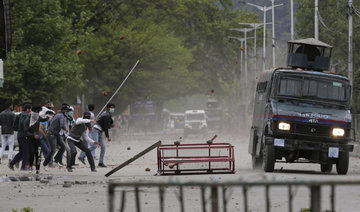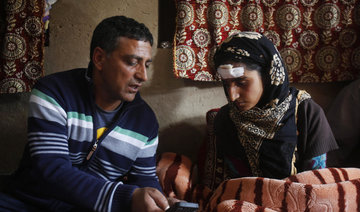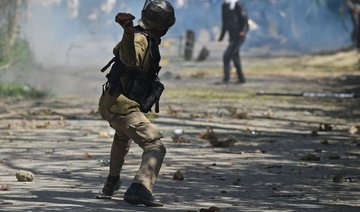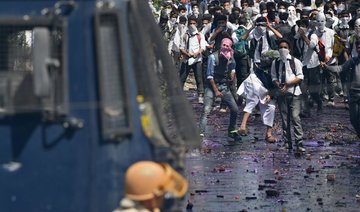SRINAGAR: One video showed a young Kashmiri man strapped to a patrolling Indian army jeep as a human shield against stone-throwing protesters. Others showed soldiers beating local men with sticks as other troops stood by with guns drawn.
As Shabir Ahmed watched the crude clips, captured on cellphone cameras and uploaded to Facebook, he felt terrified. They reminded him of his own 2001 detention by Indian army soldiers who suspected him of being a rebel sympathizer; he said they subjected him to beatings, waterboarding and drinking water mixed with chili powder.
“For two nights I couldn’t sleep. I was not shocked but exhausted” after watching the recent videos, said 38-year-old Ahmed. “I have suffered a great deal in torture by soldiers. Suddenly, I felt as if demons reopened my old wounds and started haunting me.”
Rights groups have long accused Indian forces of using systematic abuse and unjustified arrests in Indian-controlled Kashmir. The Indian government has acknowledged the problem exists, but denies it is part of a wide strategy to intimidate residents.
Kashmiris have been uploading videos and photos of alleged abuse for some years, but several recently posted clips, captured in the days surrounding a violence-plagued local election April 9, have proven to be especially powerful and have helped to intensify anti-India protests.
“Welcome to the world of social media,” said Siddiq Wahid, historian and former vice chancellor of a Kashmir university. “You don’t need verification and you don’t need proof. The optics are so clear.”
One video shows a stone-throwing teenage boy being shot by a soldier from a few meters (feet) away. Another shows soldiers making a group of young men, held inside an armored vehicle, shout profanities against Pakistan while a soldier kicks and slaps them with a stick. The video pans to a young boy’s bleeding face as he cries. Yet another clip shows three soldiers holding a teenage boy down with their boots and beating him on his back.
The video that drew the most outrage was of young shawl weaver Farooq Ahmed Dar tied to the bonnet of an army jeep as it patrolled villages on voting day. A soldier can be heard saying in Hindi over a loudspeaker, “Stone throwers will meet a similar fate,” as residents look on aghast.
“When they were driving me around, they were saying, ‘We will shoot (you),’ and were throwing stones at my head,” Dar told The Associated Press. “I was told not to talk. In one of the villages, an elderly man begged for my release but they didn’t listen to him.”
Police have since registered a criminal case against unnamed Indian soldiers in that case, for the first time citing a video as evidence. In addition, the army’s “own internal inquiry has been initiated into the jeep video,” according to spokesman Col. Rajesh Kalia.
But India’s topmost law officer, Attorney General Mukul Rohatgi, lauded soldiers for managing to defuse a “nasty situation” by containing the protests and saving the polls.
“Why so much noise?” he asked about the complaints. “Military operations cannot be subject of such discussions on social media,” Rohtagi told the Hindustan Times newspaper.
Students across Kashmir have been rallying this month at anti-India demonstrations, facing off against heavily armed riot police and paramilitary soldiers.
“Most students like me use social media, and some among us use stones to protest against India. Our brothers (militants) use guns for the same purpose,” said Aslam, a 22-year-old science major at the University of Kashmir who gave only his first name out of fear for police reprisals.
Viral videos showing police officers beating civilians or soldiers forcing children to do push-ups in public have “not only outraged the residents here, but also strengthened their belief that the remedy lies in relentlessly seeking justice to end these foul practices,” said Khurram Parvez of the Jammu-Kashmir Coalition of Civil Society.
The rights group has conducted decades of research and estimates that at least 200,000 people have been tortured during Kashmir’s decades-long separatist conflict fueled by anti-India sentiment among a mostly Muslim population and a deployment of hundreds of thousands of troops.
Kashmir’s troubles began in 1947, with the first days of Indian and Pakistani independence, as the two countries both claimed the region in its entirety. They have since fought two of three wars over their rival claims, each administering a part of the territory divided by a heavily militarized line of control.
On the Indian side, most public protest was peaceful until 1989, when armed rebels rose up demanding the region’s independence or merger with Pakistan. Nearly 70,000 people have been killed in that uprising and the ensuing military crackdown.
Among the angriest now are Kashmiris under 35, who have grown up in a politically radicalized society amid the brutal armed conflict and high unemployment. They are also among the most tech-savvy and engaged in social media, and make up two-thirds of the territory’s population of nearly 13 million.
Anti-India rebels have also adopted social media. One charismatic rebel commander, Burhan Wani, became a household name thanks to his rousing Facebook posts. His killing last year by Indian forces sparked demonstrations and street clashes across Kashmir.
Meanwhile, pro-India activists appear to have countered with their own videos, including two recently circulated showing militants forcing people to chant anti-India slogans at gunpoint.
Authorities have charged three men with attacking an Indian paramilitary soldier after they were allegedly seen in a video heckling the man.
The Indian chapter of Amnesty International has condemned videos from both sides for inciting anger and violence, and urged an investigation.
Indian police and paramilitary officials accuse agitators of using social media to instigate violence.
“There is misuse of social media by the people who are inimical to the peace,” said the region’s police director-general, S.P. Vaid. He refused to comment on media reports that the government was considering a ban on social media sites like Facebook and popular online chat application WhatsApp.
Kashmiris accuse India of doing too little to combat abuses. Military courts-martial have convicted 164 soldiers since 1990, punishing them with jail or dismissal from military service, according to an army officer who spoke on condition of anonymity because he was not authorized to speak with media. He said 96 percent of the more than 1,000 complaints received since 1990 were found to be false and fabricated.
The state government itself cannot pursue abuse cases involving soldiers without permission from New Delhi, which has never been granted despite state requests to prosecute more than 50 cases in the last two decades of alleged murder, rape and other abuse.
In the past, Indian authorities have dismissed videos and photos showing alleged abuse as propaganda stunts aimed at destabilizing the India-based administration. Some in Kashmir believe they were actually leaked by military authorities themselves to intimidate locals.
One observer, New York-based Kashmiri scholar Mohamad Junaid, posited that the “distribution of these videos is also about a fragile masculinity reasserting itself” over a population that has once again begun to aggressively challenge Indian rule.
He and other experts warned that India’s heavy-handed rule and inability to placate local protesters were pushing the region toward a dangerous impasse.
“The decision in New Delhi seems to be to push Kashmir and Kashmiris to the wall, said Wahid, the historian. “It’s only to be expected the resentment is going to reach new heights.”
In Kashmir, brutality of videos deepen anger against India
In Kashmir, brutality of videos deepen anger against India

Spain busts lucrative Chinese-Arab money laundering ring

- Police said the investigation began after the dismantling of a migrant-trafficking gang
- Police arrested 17 mostly Chinese and Syrian suspects in January
MADRID: Spanish police on Thursday said they had broken up a Chinese-Arab ring that laundered $21 million of proceeds from people and drug trafficking through the informal “hawala” money transfer system.
Police said the investigation began after the dismantling of a migrant-trafficking gang transporting mostly Syrians between Algeria and Spain, which led to a probe into their finances.
An Arab branch of the network “took charge of the reception of money in any part of the world,” while a separate Chinese branch supplied the cash in Spain in exchange for cryptocurrencies.
Police arrested 17 mostly Chinese and Syrian suspects in January — 15 in Spain, one in Austria and another in Belgium — said EU law enforcement agency Europol which supported the operation.
The network’s Belgium-based leader had “Jordanian-Palestinian nationality” and facilitated contacts within Spain, police chief inspector Encarna Ortega told a press conference in Madrid.
He is suspected of coordinating a litany of operations, mainly laundering money from the proceeds of trafficking humans and drugs, she added.
In total, the suspects moved $21 million between June 2022 and September 2024, Spanish police said.
Authorities seized from them 205,000 euros ($229,000) in cash, more than 183,000 euros in cryptocurrency, 18 vehicles, real estate property and illegal cigars worth more than 600,000 euros destined for sale in China.
Hawala is traditional system of moving money between countries based on confidence and a network of intermediaries with minimal paperwork which is popular in parts of Asia and Africa.
The method is especially common among migrant workers who send remittances to their families, but it has also been linked with financing terrorism.
Imran Khan spokesman rejects Pakistan media report party accepted PM’s offer for talks

- News report claims Khan instructed party’s chairman to hold talks with government in private for “meaningful outcomes”
- Khan aide Sayed Zulfikar Bokhari describes report as “fake news,” says government did not make any offer for talks
KARACHI: Former premier Imran Khan’s Pakistan Tehreek-e-Insaf (PTI) party spokesperson on Thursday rejected a news report that claimed he had given the green signal for fresh negotiations with the government, describing it as “fake news.”
Pakistani English language newspaper “The News” reported on Thursday that Khan had accepted Prime Minister Shehbaz Sharif’s offer to hold negotiations and instructed the party’s chairman, Gohar Ali Khan, to proceed with talks. The report said Khan had expressed “a strong preference” that the talks be conducted away from the TV cameras to ensure “meaningful outcomes.”
The PTI and the Pakistan Muslim League-Nawaz (PML-N) government have been at loggerheads ever since Khan was ousted from the prime minister’s office via a parliamentary vote in April 2022. The former premier has been in jail since August 2023 on a slew of charges he says are politically motivated. His party has led anti-government protests and marches that have led to clashes with law enforcement personnel.
“There is no such statement made by Imran Khan,” Sayed Zulfikar Bokhari, Khan’s adviser on international affairs and a former federal minister, told Arab News. “It is fake news. Neither has any offer been made to sit with Shehbaz Sharif or vice versa.”
Meanwhile, Gohar declined to comment on the development. Information Minister Attaullah Tarar and the government’s legal spokesperson, Aqeel Malik, did not respond to Arab News’ request for a comment.
Attempts to break the political deadlock in the country via a dialogue between the PTI and the government began in December 2024. However, talks collapsed after the PTI in January presented its demands, which included the formation of judicial commissions to probe the party’s anti-government protests in May 2023 and November 2024.
The violent protest rallies, including the one on May 9, 2023, saw people carrying PTI flags rampage through military offices and installations. A second anti-government protest in November 2024 was held by the party to demand Khan’s release from prison. The government says four troops were killed in clashes with Khan supporters. The PTI denies the charges and claimed its supporters were shot by law enforcers.
The PTI gave the government seven days to form the judicial commissions, after the expiry of which the party unilaterally withdrew from talks in January.
Swiss state secretary explores cooperation on ‘science mission’ to Saudi Arabia

- Martina Hirayama: ‘The mission to Saudi Arabia aims to explore potential areas of cooperation between Swiss and Saudi researchers’
- Hirayama: ‘The Swiss government supports Swiss-Saudi joint research projects through its Leading House for the MENA region, the University of Applied Sciences of Western Switzerland’
RIYADH: Swiss State Secretary for Education, Research and Innovation Martina Hirayama was in Saudi Arabia leading a science mission to strengthen partnerships and explore opportunities for further collaboration in innovation.
The Swiss delegation met Murhaf bin Mohammed Al-Madani, assistant minister of education for development and transformation; Pierre Magistretti, vice president for research at KAUST; Dr. Munir bin Mahmoud El-Desouki, KACST president; Dr. Mohammed Al-Otaibi, general supervisor at the Saudi Research Development and Innovation Authority; Axel Pierru, vice president of knowledge and analysis, KAPSARC; and a team from the King Faisal Specialist Hospital and Research Center, according to the Swiss Embassy in Riyadh.
In an interview with Arab News, Hirayama said: “The Gulf states, including Saudi Arabia, are investing heavily in artificial intelligence, nanotechnology, biotechnology, digitalization, fintech and renewable energies — areas in which Switzerland is also conducting cutting-edge research.
“The mission to Saudi Arabia aims to explore potential areas of cooperation between Swiss and Saudi researchers,” she added.
Hirayama added that in Switzerland, a bottom-up approach, autonomy of actors, a focus on excellence and competition, and international openness are basic principles of research and innovation policy. The federal government sees itself as an enabler, she said. This also applies to international cooperation, where it falls on actors to use the instruments available to them to set up transnational research projects and networks.
Commenting on existing instruments for international cooperation between both scientific communities, Hirayama said: “The Swiss government supports Swiss-Saudi joint research projects through its Leading House for the Middle East and North Africa region, the University of Applied Sciences of Western Switzerland.
“Under the Leading House model, the Swiss government mandates selected Swiss higher education institutions to establish strategic cooperation instruments that provide seed funding and support innovative pilot projects with regions with a significant scientific and technological potential,” she added.
Between 2019 and 2024, the Swiss National Science Foundation provided funding for projects led by Swiss researchers that included collaboration with Saudi Arabia, she said.
Switzerland’s education, research and innovation landscape is internationally known for its excellence and unique characteristics, the state secretary added. The system offers two strong educational pathways: Vocational education and training, and academic studies. Two-thirds of young people in Switzerland choose vocational education and training as their next step after completing compulsory education.
There are about 250 VET programs to choose from, enabling people to enter the labor market as skilled workers with a range of career prospects. VET also makes a significant contribution to Switzerland’s innovation capacity. The close link to the labor market creates a workforce that is highly skilled and adaptable to the ever-changing demands of the global economy.
On the other hand, Switzerland’s universities offer a broad range of study programs and research activities. Swiss institutions are often at the forefront of global research and innovation. They offer world-class infrastructure and enable cutting-edge research.
The importance that Switzerland attaches to research and innovation is reflected in an investment of more than 3 percent of its gross domestic product in R&D, amounting to about 25 billion Swiss francs ($29.8 billion) annually.
The high-level scientific delegation led by Hirayama included Torsten Schwede, president of the National Research Council, Laure Ognois, head of international cooperation at the Swiss National Science Foundation; Dr. Virginia Richter, rector of the University of Bern; and Yasmine Chatila Zwahlen, Swiss ambassador to Saudi Arabia.
Israel has detained 17,000 Palestinians since October 2023 in West Bank

- Reported that 66 Palestinian prisoners have died in Israeli custody since beginning of aggression
RAMALLAH: The Palestinian Prisoners Society has reported that since Oct. 7, 2023, there have been 17,000 arrests carried out in the West Bank, alongside thousands more in Gaza, according to the Jordan News Agency.
Its statement, published on the 77th anniversary of the Nakba, said that arbitrary arrests had peaked during this period.
The organization reported that 66 Palestinian prisoners had died in Israeli custody since the beginning of the aggression, and noted that detainees are subjected to systematic torture, starvation, and deprivation.
There are currently more than 10,100 Palestinians in Israeli prisons, the society reported. This number includes 37 women, over 400 children and 3,577 administrative detainees held without formal charges or having undergone a trial.
Turkiye says to continue anti-PKK operations until ‘region cleared’

- The military will “continue to act in the regions used by the separatist PKK terrorist organization with determination until it is certain the region is cleared ,” a spokesman said
- “Nothing has changed” for Turkish troops following the PKK’s announcement
ANKARA: Turkiye’s military will continue acting against PKK militants in regions where they are present until it is “certain” the threat is removed following the Kurdish group’s decision to disband, the defense ministry said Thursday, in a nod to its presence notably in Iraq.
The military will “continue to act in the regions used by the separatist PKK terrorist organization with determination until it is certain the region is cleared and will no longer pose a threat to Turkiye,” a ministry spokesman said in a briefing.
He referred specifically to “land search and scan activities, the detection and destruction of caves, shelters, mines and hand-made explosives.”
His remarks came three days after the Kurdistan Workers’ Party (PKK) announced its dissolution and the end of its four-decade insurgency that cost more than 40,000 lives.
According to a ministry source, “nothing has changed” for Turkish troops following the PKK’s announcement.
“Although the terror organization has decided to disband, we need to be careful (about provocations)... by those within the (PKK) who are unhappy with the decision,” the source added.
“If the disbanding is implemented concretely, we will return to our cleaning activities without conducting an operation to prevent these areas from being used by terrorist organizations again,” he said, without elaborating further.
Blacklisted as a terrorist organization by Turkiye and its Western allies, the PKK operates rear bases in Iraq’s autonomous Kurdistan region, where Turkiye also maintains military bases and often carries out air and ground operations against the Kurdish militants.
The PKK is also present in Syria, where Turkiye has military bases in the north and has since 2016 carried out several ground operations to force the militants away from its border.
The source said Turkiye’s MIT intelligence service would establish a mechanism for “monitoring the disarmament” that would be done in coordination with the security forces in Iraq and Syria.
“It is not possible for the Turkish armed forces to perform this task since it is in other countries,” he said.
“We will provide support if needed, we have bases there. Our presence (in Iraq and Syria) will continue until we are sure of security.”
The source also said there would be no involvement of third parties in the disarmament process.
“There will definitely be no UN or third parties. The problems in our region should be solved by the regional countries,” he said.
The weapons handover will be overseen by Turkish intelligence officials at locations in Turkiye, Syria and Iraq, who are expected to register the arms and the identity of the fighters in coordination with the Syrian and Iraqi authorities, Turkish media reports said.
“Our intelligence service will follow the process meticulously to ensure the promises are kept,” Turkish President Recep Tayyip Erdogan said Wednesday.





















